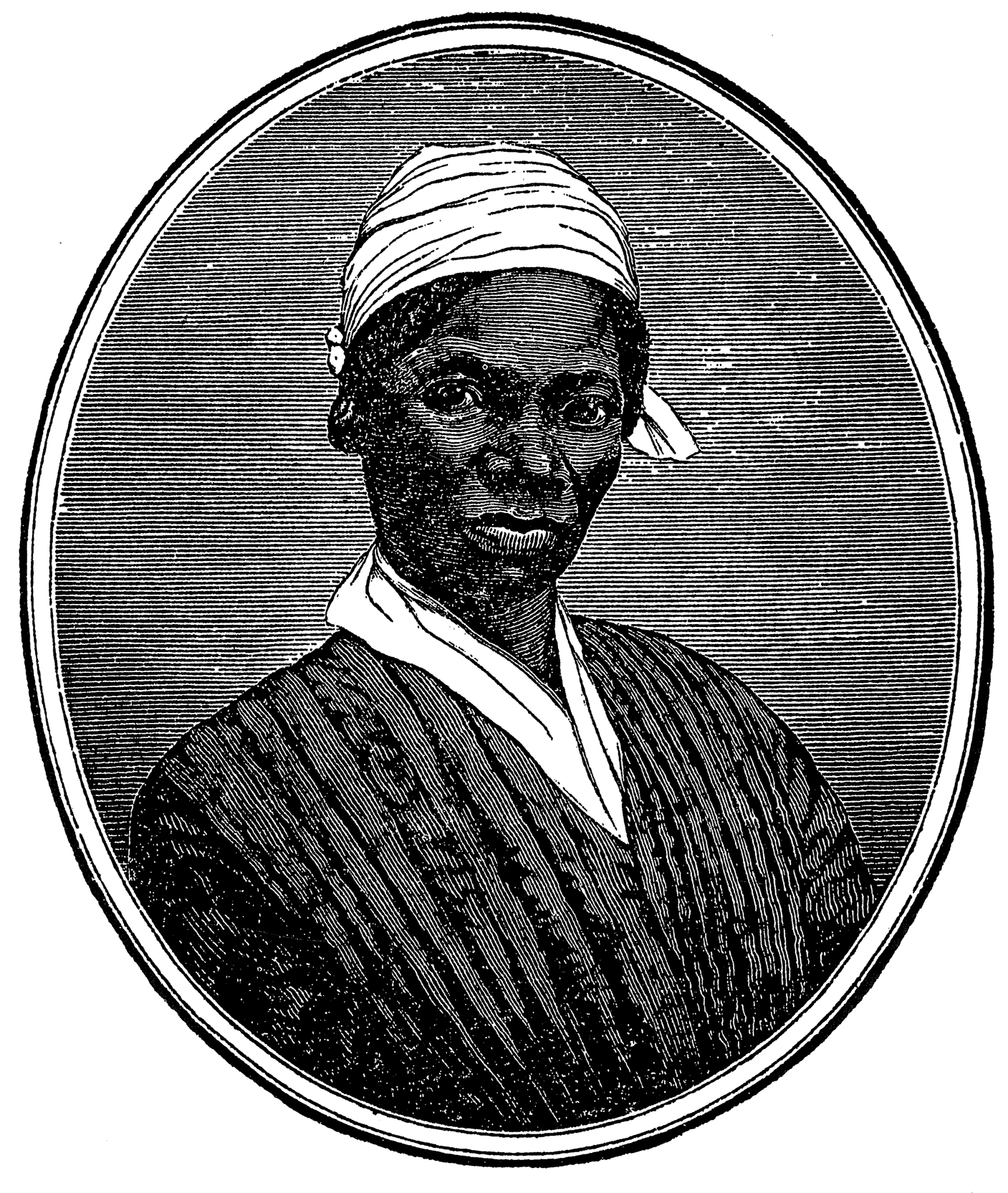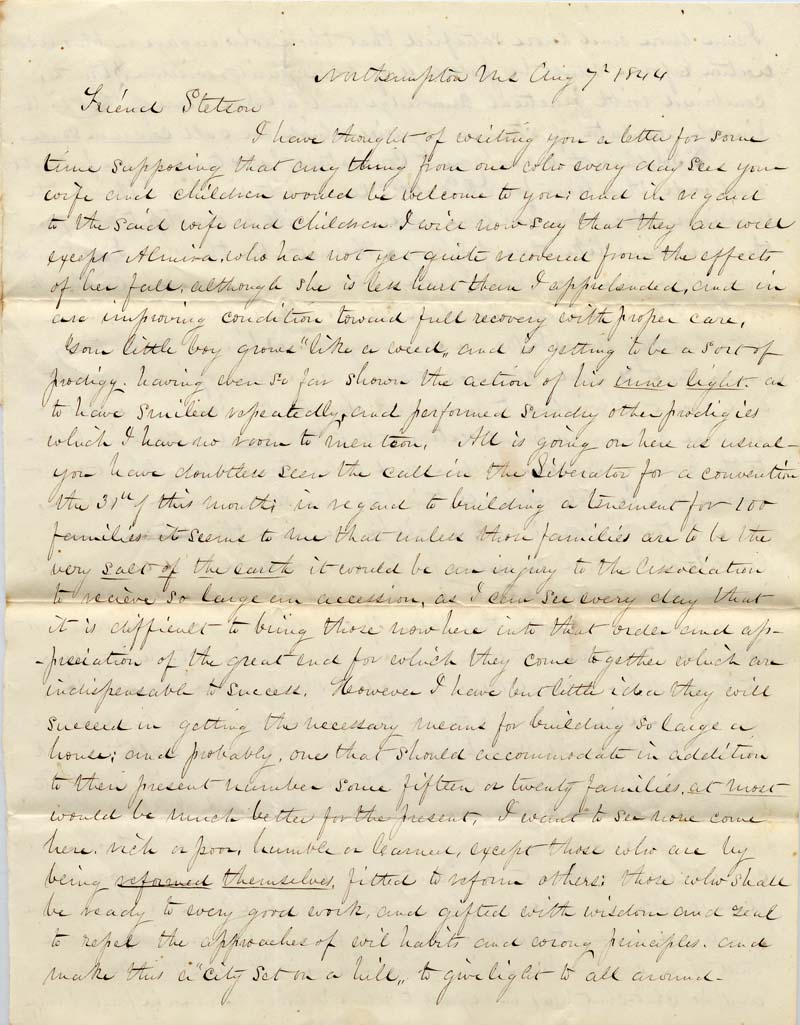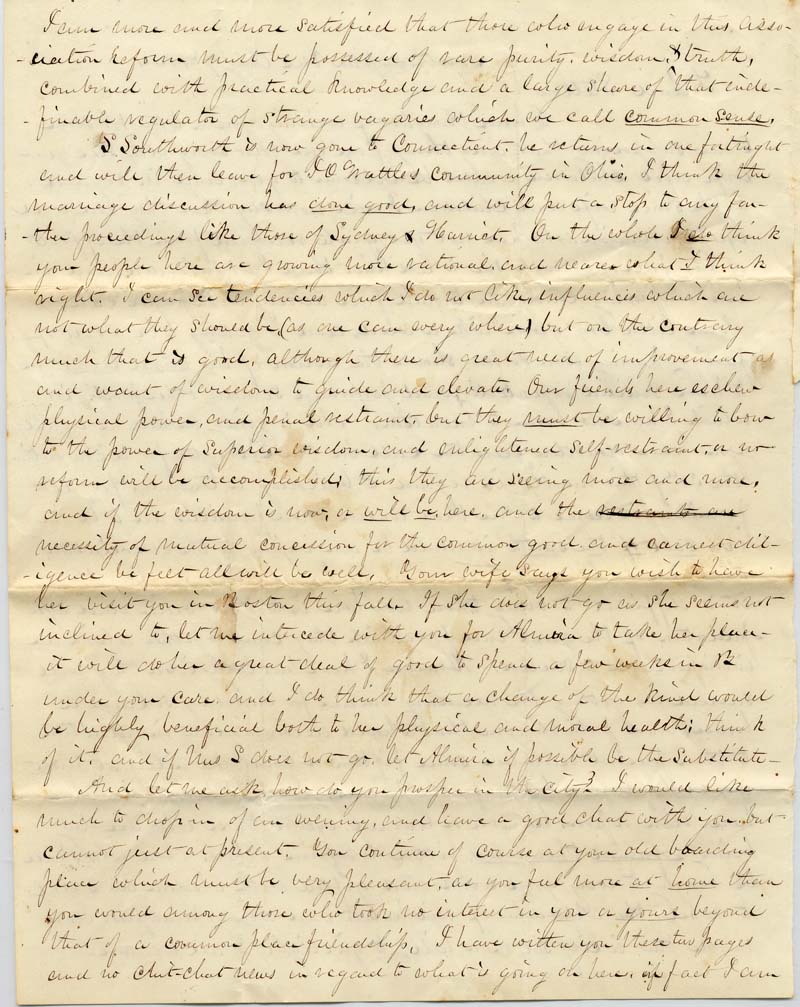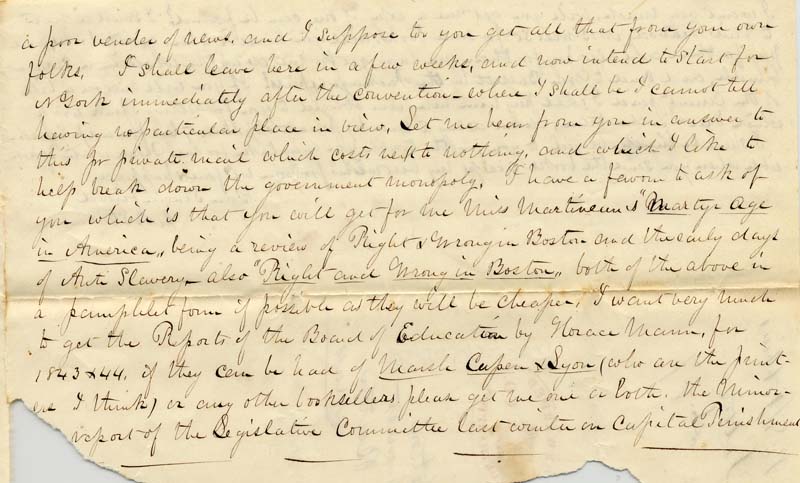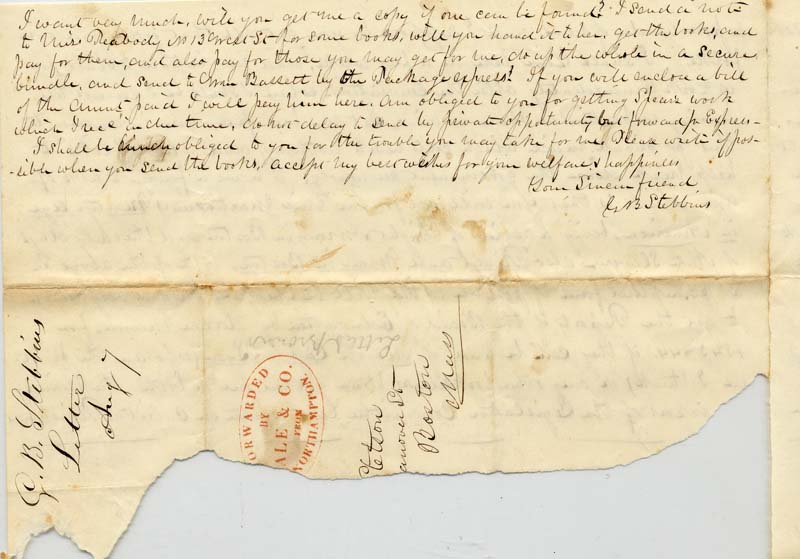Transcript:
[Aug 7, 1844]
Northampton Ms Aug 7h 1844
Friend Stetson
I have thought of writing you a letter for some time supposing that any thing from one who every day sees your wife and children would be welcome to you; and in regard to the said wife and children I will now say that they are well except Almira, who has not yet quite recovered from the effects of her fall, although she is less hurt than I apprehended, and in an improving condition toward full recovery with proper care,
Your little boy grows “like a weed,, and is getting to be a sort of prodigy, having even so far shown the action of his inner light, as to have smiled repeatedly, and performed sundry other prodigies which I have no room to mention, All is going on here as usual-you have doubtless seen the call in the Liberator for a convention the 31st of this month; in regard to building a tenement for 100 families it seems to me that unless those families are to be the very salt of the earth it would be an injury to the Association to recieve so large an accession, as I can see every day that it is difficult to bring those now here into that order and appreciation of the great end for which they come together which are indispensable to success. However I have but little idea they will succeed in getting the necessary means for building so large a house; and probably, one that should accommodate in addition to their present number some fifteen or twenty families, at most would be much better for the present. I want to see none come here, rich or poor, humble or learned, except those who are by being reformed themselves, fitted to reform others: those who shall be ready to every good work, and gifted with wisdom and zeal to repel the approaches of evil habits and wrong principles, and make this a “city set on a hill,, to give light to all around –
I am more and more satisfied that those who engage in this Association reform must be possessed of rare purity, wisdom & truth, combined with practical knowledge and a large share of that indefinable regulator of strange vagaries which we call common sense.1
S Southworth is now gone to Connecticut, he returns in one fortnight and will then leave for J O Wattles community in Ohio. I think the marriage discussion has done good, and will put a stop to any farther proceedings like those of Sydney & Harriet.2 On the whole I do think your people here are growing more rational, and nearer what I think right. I can see tendencies which I do not like, influences which are not what they should be (as one can every where) but on the contrary much that is good, although there is great need of improvement and want of wisdom to guide and elevate. Our friends here eschew physical power, and penal restraint, but they must be willing to bow to the power of superior wisdom, and enlightened self-restraint, or no reform will be accomplished; this they are seeing more and more, and if the wisdom is now, or will be here, and the restraints are necessity of mutual concession for the common good and earnest diligence be felt all will be well. Your wife says you wish to have her visit you in Boston this fall. If she does not go as she seems not inclined to, let me intercede with you for Almira to take her place – it will do her a great deal of good to spend a few weeks in B under your care, and I do think that a change of the kind would be highly beneficial both to her physical and moral health; think of it, and if Mrs S does not go, let Almira if possible be the subsitute –
And let me ask how do you prosper in the city? I would like much to drop in of an evening, and have a good chat with you, but cannot just at present. You continue of course at your old boarding place which must be very pleasant, as you feel more at home than you would among those who took no interest in you or yours beyond that of a common place friendship. I have witten you these two pages and no chit-chat news in regard to what is going on here, in fact I am a poor vender of news, and I suppose too you get all that from your own folks. I shall leave here in a few weeks, and now intend to start for N York immediately after the convention – where I shall be I cannot tell having no particular place in view. Let me hear from you in answer to this pr private mail which costs next to nothing, and which I like to help break down the government monopoly. I have a favour to ask of you which is that you will get for me Miss Martineau s “Martyr Age in America,, being a review of Right & Wrong in Boston and the early days of Anti Slavery – also “Right and Wrong in Boston,, both of the above in a pamphlet form if possible as they will be cheaper, I want very much to get the Reports of the Board of Education by Horace Mann, for 1843 & 44, if they can be had of Marsh Capen & Lyon (who are the printers I think) or any other booksellers please get me one or both. the Minor[ity] report of the Legislative Committee last winter on Capital Punishment —
I want very much, will you get me a copy if one can be found?3 I send a note to Miss Peabody No 13 West St for some books, will you hand it to her, get the books, and pay for them, and also pay for those you may get for me, do up the whole in a secure bundle, and send to Wm Bassett by the Package express? If you will enclose a bill of the Amnt paid I will pay him here. Am obliged to you for getting Spear’s work which I recd in due time, do not delay to send by private opportunity but forward pr Express –
I shall be much obliged to you for the trouble you may take for me. Please write if possible when you send the books, accept my best wishes for your welfare & happiness
Your Sincere friend
G B Stebbins
Addressed: …tetson / …anover St / Boston / Mass
Endorsed: …orwarded by …ale & Co. from Northampton.
Notes
- Though his letter to James Stetson contains news and comment on a variety of matters, it is likely that Giles Stebbins’ main purpose in writing was to enlist Stetson’s support for his opinion that any expansion of the NAEI should be small, and governed by moral rather than material considerations. In other places David Mack had started to call the projected new community building a “phalanstery,” and it is likely that Stebbins was marshalling arguments against any proposal that the NAEI should expand and adopt Fourierism. See the discussion in Clark, ” ‘We Might be Happyer Here’,” in this volume.
- Sidney Southworth, Harriet Hayden, and Lucy Hayden were planning to depart for the Prairie Home Community that had recently been founded in Champaign County, Ohio; on this community, see Thomas D. Hamm, God’s Government Begun: The Society for Universal Inquiry and Reform, 1842-1846 (Bloomington, Ind., 1995), pp. 108-122.
- In his diary for September 10, 1844, the Connecticut radical abolitionist Cyrus M. Burleigh wrote of his criticisms of the U.S. Post Office monopoly and of the power it gave the government to obstruct righteous causes. For Hale and Co., the carrier that would convey Giles Stebbins’s letter and some others now in the Stetson collection, Burleigh had praise as “a grand establishment and I am right glad that it is put in operation; … success I say to the independent mail.” (Cyrus M. Burleigh, Journal, August 1, 1844 – , Burleigh Collection, Am 8192, Historical Society of Pennsylvania, Philadelphia).
Harriet Martineau, The Martyr Age of the United States (New York, 1839) was a pamphlet version of an article published the previous year in the Westminster Review (London). Martineau’s article had spread word of the American abolitionist movement in Britain and was among the first writings to compare the position of women with that of slaves.
Right and Wrong in Boston was the title of the Boston Female Anti-Slavery Society’s annual report, edited by Maria Weston Chapman.
Among signatories to a petition submitted to the Massachusetts legislature for the abolition of the death penalty in the winter of 1843-44 had been Erasmus D. Hudson and George W. Benson of the NAEI, and Abner Sanger of Danvers, one of its financial backers (Liberator, February 9, 1844).

